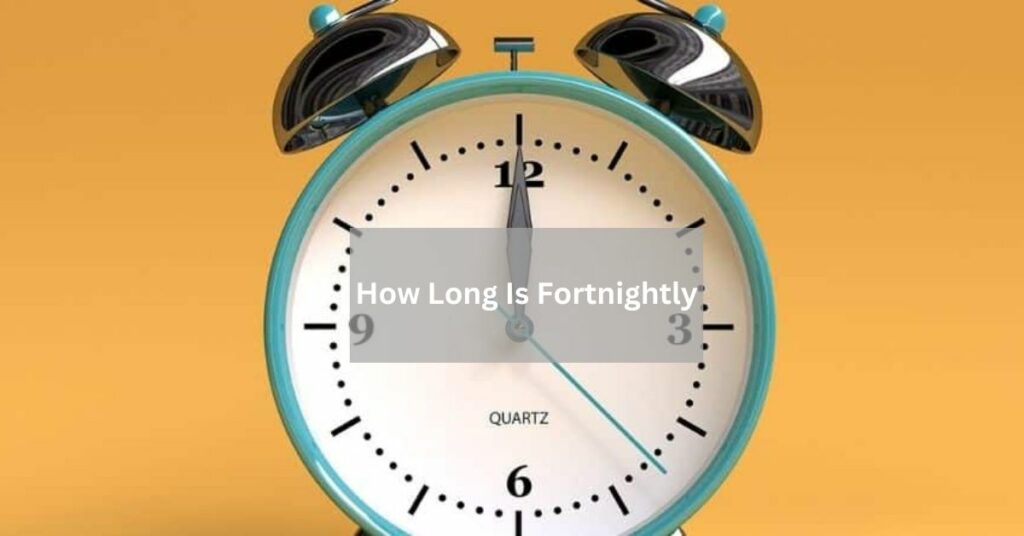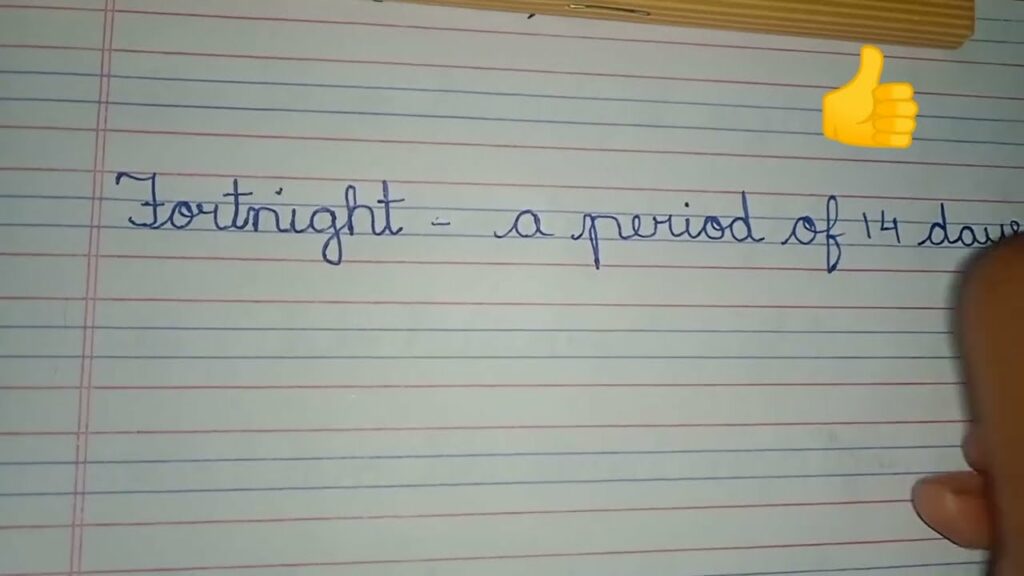How Long Is Fortnightly – Unravel The Mystery!
1 min read
how long a fortnightly period lasts helps me plan my activities better. It’s like having an explicit schedule for two weeks, making organizing events and managing my time effectively easier. Knowing that a fortnight is just two weeks long simplifies my routine and ensures I stay on track with my plans.
A fortnight means two weeks or fourteen nights. It’s not common in American English but is often used in England or old British stories. It’s 14 days, originating from Old English for “fourteen nights,” as Anglo-Saxons counted days by nights.
What Is A Fortnight? – Embrace Fortnight Awareness!
Often overlooked in daily discourse, a fortnight embodies a distinctive measure of time. It spans fourteen consecutive days or two weeks.
Despite its practical significance, its cultural and linguistic prominence tends to fade in modern usage.
However, embracing fortnight awareness unveils its relevance in various contexts. From scheduling and planning to historical references and literary works, the fortnight weaves through the tapestry of time.
Acknowledging and integrating this temporal unit into our lives enhances our understanding of time management and cultural heritage.
What Is The Difference Between “Fortnite” And “Fortnight”? – Let’s Talk About It!

“Fortnite” and “fortnight” share a phonetic similarity yet diverge significantly in meaning and context. “Fortnite” refers to a popular online video game developed by Epic Games, featuring battle royale gameplay.
On the other hand, “fortnight” denotes two weeks, rooted in Old English as a contraction of “fourteen nights.
While “Fortnite” dominates contemporary pop culture, “Fortnight” maintains its historical and practical significance.
Despite their linguistic connection, these terms epitomize the intersection of digital entertainment and temporal measurement, showcasing the dynamic evolution of language in modern society.
Fortnight in the USA – The information you seek!
The term “fortnight” refers to fourteen consecutive days or two weeks. While commonly used in England, Scotland, Wales, Ireland, Canada, New Zealand, Australia, and other former British Empire countries, it’s less known in the USA. Derived from Old English, “fortnight” is a contraction of “fourteen nights.
Although the USA doesn’t use this term widely, many accounting periods and salary payments in the country are based on the English system of dividing the year into fourteen-night periods. In Latin countries, the norm tends to be fifteen nights rather than fourteen.
Similar to “fortnight,” another term, “se’night” or “sennight,” meaning seven nights, appears in literature like Jane Austen’s works but has largely been replaced by “week” in modern English.
Ultimately, whether it’s a fortnight, a night, or any other time measurement, it reflects our collective human obsession with tracking the passage of time.
Examples Of Using ‘fortnight’ In A Sentence – Let’s Read It!

Here are expanded examples for each point:
1. Casual Conversation:
I’ll be away on vacation for a fortnight, exploring the picturesque countryside, lounging by tranquil lakes, and immersing myself in the local culture. It’ll be a refreshing break from the hustle and bustle of city life.”
2. Project Deadlines:
With only a fortnight remaining until the project deadline, we must streamline our efforts, allocate resources efficiently, and ensure all tasks are completed to the highest standards. Effective collaboration and meticulous planning are essential for success.”
3. Historical References:
The siege of the ancient city lasted for a fortnight, as besieging forces launched relentless assaults against its fortified walls while defenders valiantly repelled every onslaught. The outcome of this decisive battle shaped the course of history for generations to come.”
4. Literary Context:
In Jane Austen’s beloved novel, the protagonist eagerly awaited her suitor’s return, counting the days until his anticipated arrival in a fortnight.
Her heart fluttered with excitement and anticipation as she dreamed of their reunion and the possibility of a future together.”
5. Routine Activities:
She diligently visits her elderly neighbor every fortnight, helping with household chores, sharing heartfelt conversations over cups of tea, and providing companionship and support during moments of solitude.
Their bond transcends mere neighbourly acquaintance, blossoming into a cherished friendship built on mutual care and kindness.”
What Was So Significant About Two Weeks That It Got Its English Word, “Fortnight”? – Know It Now!

The significance of the term “fortnight” is deeply intertwined with historical, cultural, and practical aspects of human civilization.
Dating back to ancient times, the division of time into approximately two-week periods held significance in various spheres of life.
From agricultural cycles to maritime navigation, the fortnight provided a convenient unit for organizing labour, planning activities, and measuring distances.
This temporal concept transcended practical utility and became embedded in cultural traditions, folklore, and literature.
As societies evolved, so too did the linguistic representation of this temporal unit, giving rise to the term “fortnight” in Old English.
Its enduring presence in language reflects the importance of two weeks as a distinct period, shaping how people perceive and navigate the passage of time in their daily lives.
FAQs:
1. Who Uses Fortnight?
The term “fortnight” is commonly used in English-speaking countries such as the United Kingdom, Australia, New Zealand, and others influenced by British English. Its usage extends across different contexts, including everyday conversation, literature, business, and administrative practices.
2. When Did We Stop Saying ‘Fortnight’?
The usage of “fortnight” remains prevalent in many English-speaking regions, although its frequency may vary over time and across different demographics. While some may opt for more contemporary or concise expressions, “fortnight” continues to endure in language and culture, reflecting its enduring relevance.
3. Is a Fortnight Exactly Two Weeks?
Yes, a fortnight precisely equates to two weeks, totaling fourteen days. This consistent duration distinguishes it from other time intervals, offering an unambiguous measure of time.
4. How Does a Fortnight Compare to Other Time Intervals?
A fortnight is a distinct time interval, extending twice as long as a week, yet shorter than a month. With fourteen days encompassed within its duration, a fortnight strikes a balance between the brevity of a week and the lengthier span of a month.
Conclusion:
A fortnight lasts precisely two weeks, which means it’s fourteen days long. This time unit has deep roots in history and culture and influences how we schedule things and talk about time. Knowing about fortnights helps us better understand time.
Read:





